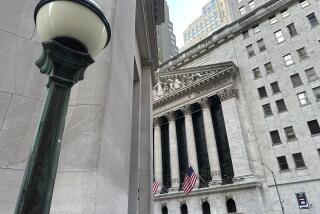T-Bond Yields Above 8% Send Stocks Tumbling : Markets: Highest long-term interest rates since April, 1992, reflect strength in business activity and inflation fears.
- Share via
Long-term Treasury bond yields closed above 8% for the first time in 2 1/2 years Monday, spurring another slump in the stock market and raising the stakes in the Federal Reserve Board’s gamble to slow the economy.
The 30-year Treasury bond yield, a benchmark for long-term interest rates, including mortgage rates, jumped to 8.04% on Monday from 7.97% on Friday amid a flurry of morning selling by bond traders.
The T-bond yield had flirted with the psychologically important 8% level last week as market interest rates moved steadily higher, but Monday’s session marked the first close above 8% since May, 1992, and was the highest yield on the bond since it hit 8.06% on April 29, 1992.
The stock market, which had rallied in the morning thanks to continuing strong corporate earnings reports, gave up its gains in the afternoon and closed sharply lower. The Dow industrial average dropped 36 points to 3,855.30, bringing its losses over the past three sessions to 81 points.
Analysts described the bond market’s latest selloff, in a bear market that is already a year old, as a continuation of the same basic theme: Investors fear that the economy isn’t slowing, and thus that the Fed will have to raise short-term interest rates further--and perhaps dramatically--to dampen growth in order to keep inflation under control.
Analysts said one catalyst for Monday’s yield surge was traders’ jitters over this Friday’s scheduled government report on third-quarter economic growth. Fears are rising that the report will show the economy expanded at a fast pace in the quarter, despite five Fed rate hikes this year, the most recent in mid-August.
Expectations of another Fed rate hike were evident in Monday’s weekly auction of three- and six-month Treasury bills, where yields rose to their highest levels in more than three years. The yield on six-month T-bills jumped to 5.75% from 5.57% a week ago.
“The market is tightening credit for the Fed,” said Kevin Logan, economist at Swiss Bank Corp. in New York. While the Fed is widely expected to wait until after the Nov. 8 election before making a decision about short-term rates, the market has already decided that the economy is strong enough to warrant higher rates, he said.
And as short-term rates continue to rise, investors have little incentive to buy long-term bonds, despite the relative attraction of 8%-plus yields, experts say.
Worse, analysts say the danger is that the longer the Fed delays tightening, the bigger the eventual rate boost may have to be to allay market fears about inflation.
Sentiment among bond investors has turned “overwhelmingly” negative, said Kevin McClintock, who manages $7 billion in bonds at Aeltus Investment Management in Hartford, Conn. “It’s about as bearish as I’ve seen it.”
Also weighing on investors Monday were concerns about a heavy new supply of bonds coming to market this week. The Treasury will sell a total of $28.25 billion of new two- and five-year notes today and Wednesday.
Meanwhile, the bond market virtually ignored a piece of good news, as President Clinton announced Monday that the fiscal 1994 federal budget deficit was $203 billion, the smallest in five years.
Traders said the deficit, once the bond market’s biggest bogeyman, has been eclipsed by worries about robust economic growth and potentially higher inflation.
In the stock market Monday, an early rally in the Dow was credited to strong quarterly earnings from Caterpillar, an industrial issue that has become a symbol of the renaissance in American manufacturing.
Caterpillar closed up 1 7/8 to 58 1/4, but the broad market began to slide in late morning as bond yields rose, and most stocks closed near their lows for the day. On the NYSE, losers outnumbered winners by more than 2 to 1, though trading was moderate.
Among major stock indexes, the Standard & Poor’s 500 lost 4.06 points to 460.83, and the Nasdaq composite of mostly smaller stocks fell 4.17 points to 761.21.
Among the market highlights:
* Interest-sensitive stocks such as banks and insurers were broadly lower as bond yields jumped. Citicorp fell 3/4 to 44 1/2, BankAmerica lost 5/8 to 42 1/4, SunAmerica sank 1/2 to 37 1/2, Coast Savings lost 3/4 to 15 5/8 and Federal National Mortgage dropped 1 7/8 to 75.
* Profit takers hit some industrial issues. Alcoa fell 2 1/2 to 86 1/4, Kodak lost 1 7/8 to 47 3/4 and International Paper dropped 2 to 76 7/8.
* Though third-quarter earnings reports have been generally positive for the market, a notable disappointment Monday was Airborne Freight, which plunged 6 3/8 to 19 1/8 after reporting lower-than-expected results.
The news dragged other transportation issues lower, including Federal Express, off 1 3/4 to 61 7/8, and AMR, parent of American Airlines, down 1 5/8 to 51 3/8.
* On the plus side, Stratus Computer jumped 1 3/4 to 36 1/4 after it posted a sharp rise in earnings.
Overseas, Tokyo’s 225-share Nikkei average ended down 46.71 points at 19,852.37. In Frankfurt, the DAX index inched up 3.16 points to 2,025.38, while London’s FTSE 100 index was off 3.7 points at 3,029.1.
In currency trading, the dollar finished in New York at 1.494 German marks, compared to 1.499 on Friday in light trading. Against the Japanese yen, the dollar eased to 97.13 yen from 97.19.
In commodity markets, gasoline futures prices hit an eight-week high on continued worries over a severed Houston pipeline that has cut back shipments to the Northeast. November gasoline futures rose 2.59 cents to 52.46 cents a gallon on the New York Merc.
Market Roundup, DX
More to Read
Inside the business of entertainment
The Wide Shot brings you news, analysis and insights on everything from streaming wars to production — and what it all means for the future.
You may occasionally receive promotional content from the Los Angeles Times.










